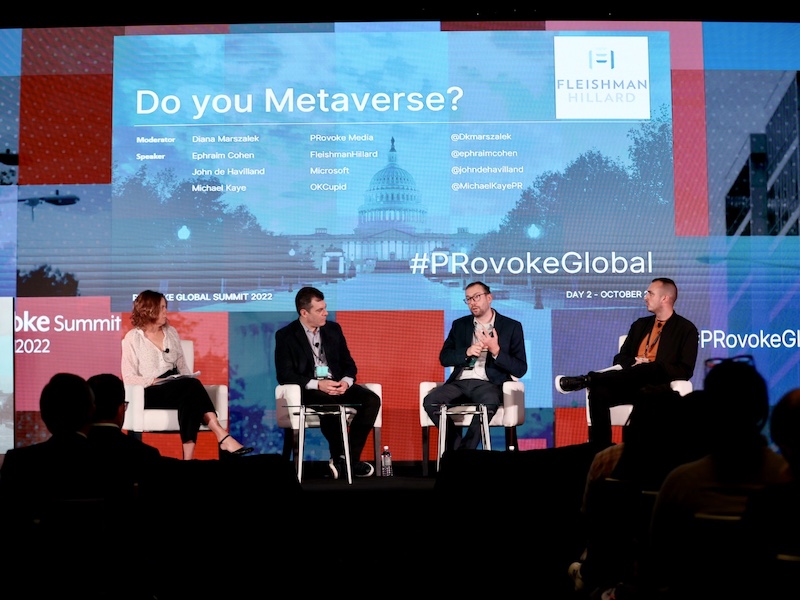Maja Pawinska Sims 26 Oct 2022 // 6:20PM GMT

WASHINGTON, DC — Brands and communicators should proceed with caution in their approach to the metaverse, but must be prepared to experiment to make the most of opportunities in the fast-evolving virtual world, according to speakers at PRovokeGlobal this week.
In a panel session at the global summit, FleishmanHillard’s global managing director of media and platforms, Ephraim Cohen, said “no-one owns the definition of the metaverse”.
He outlined the difference between existing and relatively mature metaverses with their origins in the world of gaming, such as Fortnite, Second Life, Minecraft and Roblox, which already have huge global communities of players, and ‘the metaverse’, which is a potential future where all metaverses, including newer platforms such as Decentraland and Sandbox, are connected and users can move seamlessly between worlds with a single or multiple virtual persona.
Cohen said when it comes to what brands can do in the metaverse, “there’s what you can do and what you should do”. He pointed to early metaverse game Fortnite’s efforts in virtual events and said: “Multiple virtual, immersive events where large communities are gathering together is a burning communications and branding opportunity.” But he asserted that, so far, “no company has yet figured out an ongoing communications strategy to connect with audiences in the metaverse.”
From creating virtual goods to test their possible popularity in the real world and collectable virtual sneakers, to applications around gathering people together for immersive education and training sessions, Cohen said “there could be great applications for communicators in the metaverse that we just haven’t thought of yet.”
At Microsoft, general manager of digital and app innovation John de Havilland said the technology was evolving fast beyond the gaming world: “As we’re looking at what the metaverse is going to be, the technology is there already to bring communities together in immersive virtual experiences, and the power of the cloud is accelerating at scale.
“There are elements of the metaverse that we’re not even thinking of yet, from industrial applications, such as digital twin replicas of manufacturing plants or concept car design, to working out layout and flow in retail stores or airports, blending the digital and real world. Then there’s the enterprise angle: when we show up for work we are already communicating virtually on Teams calls, so how can we make that experience more collaborative and immersive?”
At OkCupid, global head of communications Michael Kaye outlined the dating site’s own experience of dipping a toe in the metaverse: “As a brand, we love trying new things, we’re testers, we jumped right into TikTok and Clubhouse to experiment, and it felt like a natural progression to enter the metaverse.
“We had data showing that 35% of people across all demographics are interested in going on a date in the metaverse. In the pandemic we saw people dating virtually and decided to experiment in this space — for us it was simply a brand test. We created a virtual Pride celebration in Decentraland for the LGBTQA community in Turkey, one of our more conservative markets, where it’s difficult to be openly queer. It was a powerful moment for us, advocating around an important cause and creating a safe space for a community we care about.”
Kaye said OkCupid did not have concrete plans for further metaverse activations, but urged brands to start taking action to explore: “It’s important that none of us shy away from this space; brands should not be afraid of this alternate universe. Educate yourself and explore.”
Discussing whether there were new liabilities or concerns for brands to consider when moving into the metaverse, de Havilland said: “The challenges we are facing on social will still exist in similar and new ways in the metaverse. As the technology is evolving, defining standards and boundaries will be a challenge, and with AI driving experiences, we need to think about morality and ethics.”
Kaye said the level of control brands had over their virtual presence, and how vulnerable they might be, was a similar concern in a fledgling metaverse as it was at the start of the social media era, while Cohen said he would advise brands and communicators to “Proceed with caution always — we don’t know all the reputation risks yet. But Facebook and Twitter conversations today were seen as major risks 10 years ago. There will be surprises along the way, but part of crisis management is to be ready for surprises and this will be the same here.”
Cohen also advocated for experimentation: "Test and learn, try it out, build and experiment, talk to consumers about what they like and see what trends emerge. The rate of change is faster than ever before and while it feels like we are as an industry like squirrels with a shiny new object, it’s very possible that the metaverse will be very mainstream in only a few years.
“If nothing else, when your CEO asks what we’re doing in the metaverse, we need to have an articulate answer. Take time to understand the risks and opportunities now rather than waiting to start when others have been there for a while. It’s about constant learning and exploration, and having a mandate to be ready for how it evolves.”



































.jpg)

















